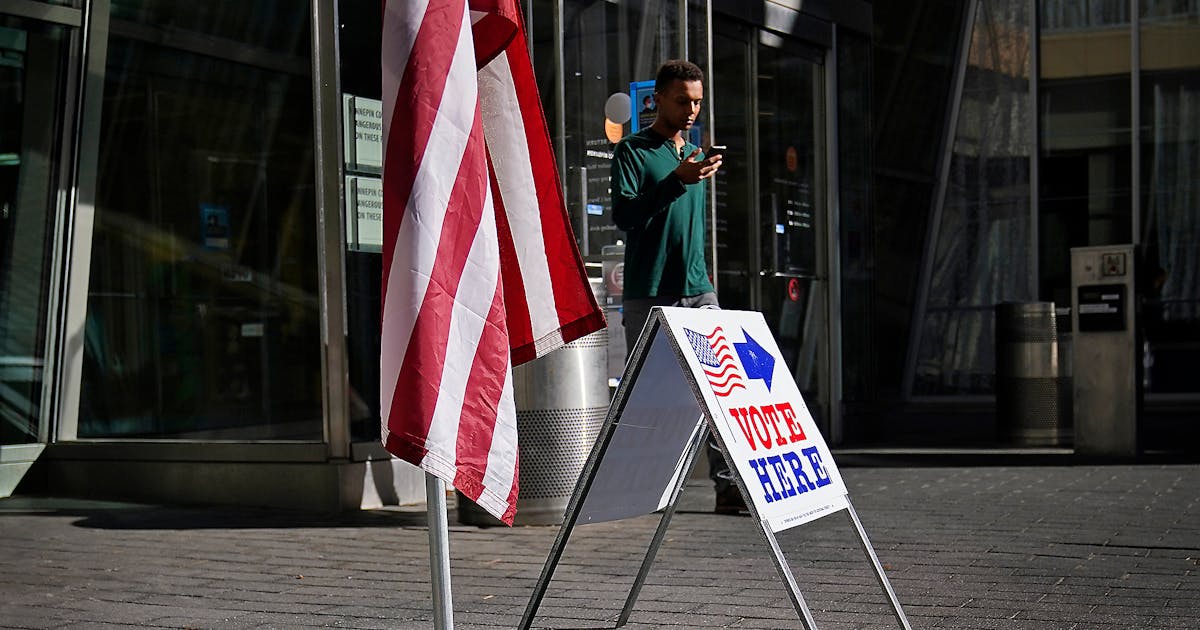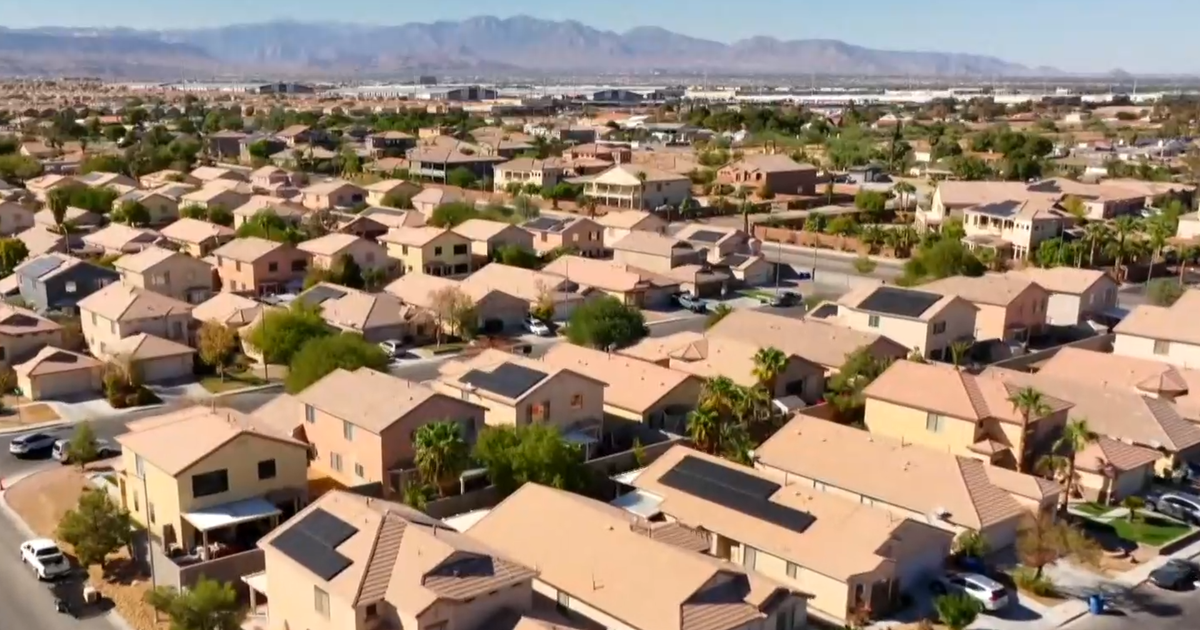Star Tribune
With big issues at stake, young voters are tuning in to the city elections in Minneapolis and St. Paul

With the release of one dire climate report after another, Emma Wolters began to struggle with existential dread. Searching for ways to navigate through that fear as a teenager, Wolters joined a small, student-run climate action group.
Wolters was surprised that, even as high schoolers, the group was able to get an audience with local sustainability coordinators — and even St. Paul Mayor Melvin Carter — as St. Paul developed its climate action plan. Though federal politics felt out of reach, getting involved in local government made her feel as if she could make a difference on big issues.
“The power of local representatives in actually shaping the day-to-day lives of people like me. … That just became more and more clear,” said Wolters, now 22.
With critical municipal elections on the ballot in Minneapolis, St. Paul, Duluth and other Minnesota cities, Wolters and other young people around the state are encouraging their peers to head to the polls. Though off election years see fewer voters, energy around the issues is high for a generation motivated by climate change, racial justice and access to affordable housing.
In Minneapolis, several young candidates are jostling to send the divided council further left. In St. Paul, a slate of young, diverse women are hoping to become the first all-women St. Paul City Council in history. And across the state, high school students as young as 16 and 17 already are taking advantage of a new Minnesota law allowing them to preregister to participate in the political process in the future.
“I think it’s a really exciting election year in both Minneapolis and St. Paul,” said campaign volunteer Meg Daly, 27. “Particularly in St. Paul, I think we have the opportunity to win the most progressive council that we’ve ever seen, and that’s really exciting.”
More than 40 million members of Gen Z alone will be eligible to vote in 2024 — an increase of 8 million people who have aged into electorate since the 2022 midterms, according to research from the Center for Information and Research on Civic Learning and Engagement (CIRCLE). About 45% of those Gen Zers are youth of color.
In recent months, more than 1,500 teens have preregistered to vote in future elections, according to the office of Minnesota Secretary of State Steve Simon.
Though young people often are thought of as disengaged, especially in local election years, another CIRCLE study found that in 2022, Gen Z voted at a higher rate in their first midterm election than millennials or members of Generation X. That’s a promising statistic for people looking to change the narrative that young voters are unreliable.
Chelsea Sheldon, co-founder of Believe In What’s Possible, a youth-led Minnesota Gen Z political events organization, believes her generation is deeply engaged but has seen little investment from mainstream political organizations, she said.
They host meetings like sip and paints events or music festivals to create spaces to talk to young people and invite their generation in. They provide election resources tailored to their generation, and make sure spaces do not feel exclusionary, said Sheldon, 23.
“A lot of us express that ‘I don’t want to be engaged because I don’t want to make the wrong choice, because I don’t want to feel stupid, because I don’t want to elect a leader that I don’t know will speak on behalf of my values,'” Sheldon said. “Without spaces that tell us it’s okay to have questions, that can be really paralyzing.”
Voters that come to events are concerned with some of the most visible issues: responses to encampments in Minneapolis or transit and access to affordable housing, Sheldon said.
At just 16, Charlie St. Dennis,a high school student and organizer already has volunteered with more than 40 political campaigns. This election, his work was noticeable enough to secure him a role with Anika Bowie’s City Council campaign in St. Paul’s First Ward.
The ward has had some of the lowest voter turnout in St. Paul, St. Dennis said, and they often engage people who did not have the council election on their radar,
“We’re talking to a lot of people that just up until recently, and even now, are still unfamiliar with the fact that there even is an election coming up, and a lot of people that haven’t voted before,” St. Dennis said.
Housing affordability is top of mind for many renters and potential homeowners who are facing high property taxes and the effects of the 2021 rent control ordinance in St. Paul, he said.
Daly, the St. Paul volunteer, has knocked on a couple of hundred doors in St. Paul’s First Ward. It’s a mixed bag in terms of awareness of the election, Daly said, although most of her friends are planning to vote by virtue of being her friend.
Woodbury high school student Noah Yehalashet told himself he couldn’t just sit around and complain about politics. Last year, he served as a student representative on his school board. This year, the 17-year-old is managing a school board campaign.
“There’s a higher reward there than just trying to be involved with the White House,” he said. “School board, city council is where you’ll see the most impact but also where you’ll have the most access.”
Only setting your sights on the big picture, federal level, will almost always make you feel helpless said Wolters, an organizer with the Hwa Jeong Kim’s City Council campaign in St. Paul’s Fifth Ward.
“It’s so easy to get involved,” Wolters said. “Reach out to people in your neighborhood. Look online for community events. You will find the community and the solutions that you’re looking for on a scale that will impact your daily life.”
Star Tribune
Minnesotans reflect on Biden’s apology

Lt. Gov. Peggy Flanagan and her daughter were among the throngs Friday as President Joe Biden delivered the apology that many Indigenous Americans thought would never come.
“I think he really said the things that people have been waiting to hear for generations, acknowledged just the horror and trauma of literally having our children stolen from our communities,” said Flanagan, a member of the White Earth Band of Ojibwe. “It’s a powerful first step towards healing.”
Hundreds of boarding schools operated in the 19th and 20th centuries, separating Indigenous children from their families and forcing them to assimilate to European ways. Many children were abused, and at least 973 died, according to a report from the U.S. Department of the Interior.
Other Minnesotans reacted similarly to Flanagan, saying they welcomed the apology but that additional action is needed to help Indigenous people move forward.
Anton Treuer, a professor of Ojibwe at Bemidji State University, wrote in a newsletter that the apology was “a welcome first step on the journey to healing.”
“There is no way to truly right historical injustices for the children buried at Carlisle, Haskell, and other schools, but these words set a new tone for the country and will help heal the anguish so many Natives have carried for so long,” Treuer wrote. “It gives me hope that we can come together to reconcile and heal our troubled nation.”
Sen. Mary Kunesh, DFL-New Brighton, the first Indigenous woman to serve in the state Senate, called Biden’s apology encouraging.
“This recognition of past wrongdoings is an important step towards healing relationships between the United States and the sovereign nations affected by these past systems,” Kunesh said in a statement. “This dark period of American history must be remembered and taught.”
Star Tribune
MPD on defensive after man shot in neck allegedly by neighbor on harassment tirade

“I have done everything in my power to remedy this situation, and it continues to get more and more violent by the day,” Moturi wrote. “There have been numerous times when I’ve seen Sawchak outside and contacted law enforcement, and there was no response. I am not confident in the pursuit of Sawchak given that Sawchak attacked me, MPD officers had John detained, and despite an HRO and multiple warrants — they still let him go.”
On Friday, five City Council members sent a letter to Mayor Jacob Frey and Police Chief Brian O’Hara expressing their “utter horror at MPD’s failure to protect a Minneapolis resident from a clear, persistent and amply reported threat posed by his neighbor.”
Council Members Andrea Jenkins, Elliott Payne, Aisha Chughtai, Jason Chavez and Robin Wonsley went on to allege that police had failed to submit reports to the County Attorney’s Office despite threats being made with weapons, and at times while Sawchak screamed racial slurs. Sawchak is white and Moturi is Black.
The council members also contend in their letter that the MPD told the County Attorney’s Office that police did not intend to execute the warrant for “reasons of officer safety.”
At a Friday afternoon news conference at MPD’s Fifth Precinct, O’Hara said police had been working to arrest Sawchak since at least April, but “no Minneapolis police officers have had in-person contact with that suspect since the victim in this case has been calling us.” The chief pointed out that Sawchak is mentally ill, has guns and refuses to cooperate “in the dozens of times that police officers have responded to the residence.”
O’Hara put aside the option to carry out “a high-risk warrant based on these factors [and] the likelihood of an armed, violent confrontation where we may have to use deadly force with the suspect.” The preference, he said, was to arrest Sawchak outside his home, but “in this case, this suspect is a recluse and does not come out of the house.”
Star Tribune
Rochester lands $85 million federal grant for rapid bus system

ROCHESTER – The Federal Transit Administration has green-lighted an $85 million grant supporting the development of the city’s planned Link Bus Rapid Transit system.
The FTA formally announced the grant on Friday during a ceremonial check presentation outside of the Mayo Civic Center, one of the seven stops planned for the bus line. The federal grant will cover about 60% of the project’s estimated $143.4 million price tag, with the remaining funds coming from Destination Medical Center, the largest public-private development project in state history.
Set to go live in 2026, the 2.8-mile Link system will connect downtown Rochester, including Mayo Clinic’s campuses, with a proposed “transit village” that will include parking, hundreds of housing units and a public plaza. The bus line will be the first of its kind outside the Twin Cities — with service running every five minutes during peak hours.
“That means you may not even need to look at a schedule,” said Veronica Vanterpool, deputy administrator for the FTA. “You can just show up at your transit stop and expect the next bus to come in a short time. That is a game changer and a life-transformational experience in transit for those people who are using it and relying on it.”
The planned Second Street corridor is already one of the busiest roads in Rochester, carrying more than 21,800 vehicles a day, and city planners have talked for years about ways to reduce traffic congestion in the city’s downtown. Local officials estimate that the transit line, which will rely on a fleet of all-electric buses, will handle 11,000 riders on its first day of operation and save eight city blocks of parking.
Speaking to a crowd of about 100 people gathered on Friday, Sen. Amy Klobuchar said the project shows Rochester is thinking strategically about how it handles growth.
“If you just plan the business expansion, and you don’t have the workforce, you don’t have the child care, the housing or the transit, it’s not going to work very well as a lot of communities across the nation have found,” Klobuchar said.





GIPHY App Key not set. Please check settings